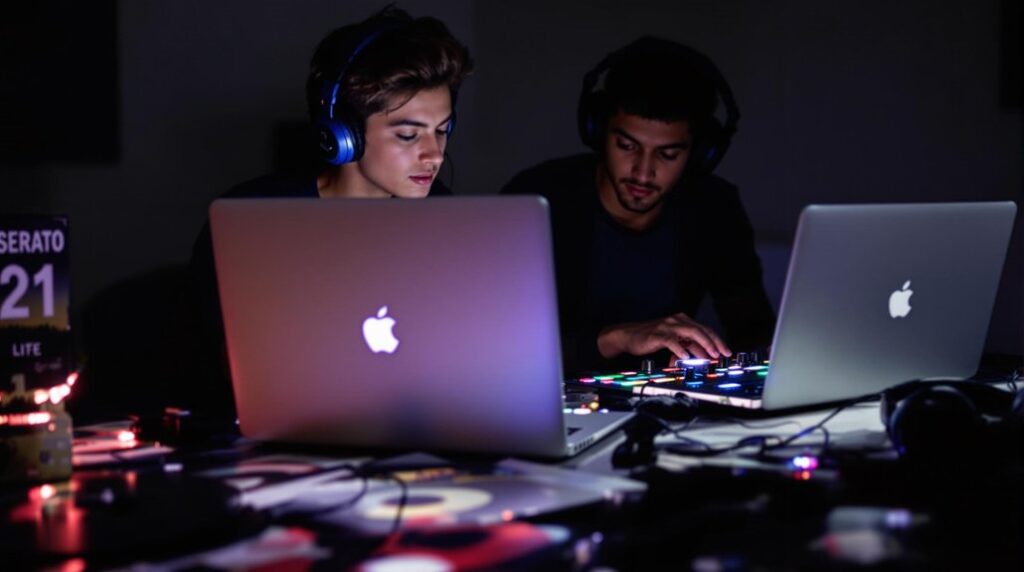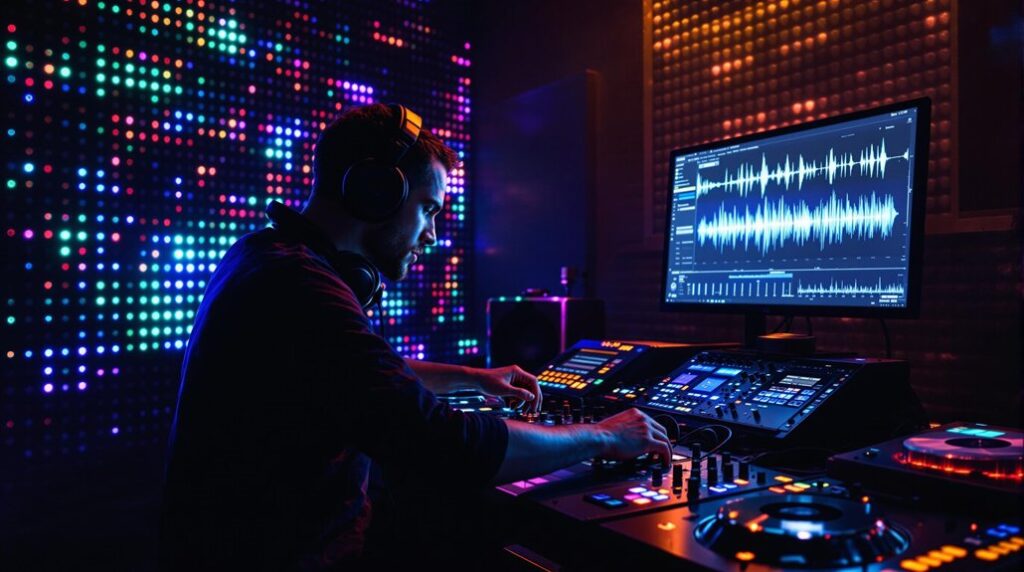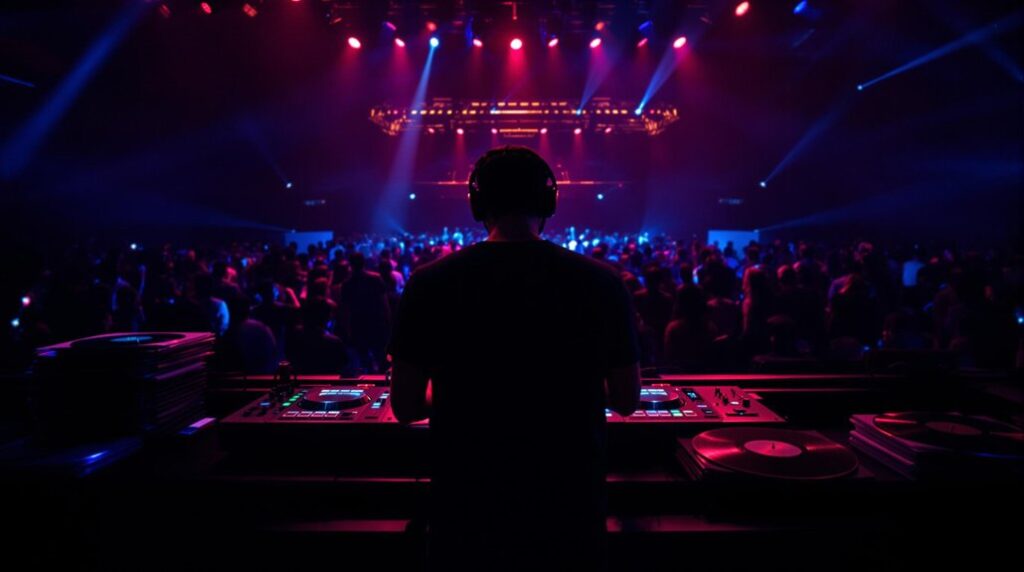New DJs should master key skills like reading the crowd, seamless beatmatching, and developing a unique sound by blending genres. Proficiency in using DJ equipment and choosing the right software, such as Serato or Virtual DJ, is vital. Building a diverse music collection and effectively promoting mixes enhances visibility. Continuous practice, networking at events, and engaging in DJ communities are essential for securing gigs. Additional insights illuminate more strategies to succeed in the DJ world.
Key Takeaways
- Master beatmatching to ensure seamless transitions between tracks.
- Develop EQ mixing skills to maintain audio harmony during sets.
- Build a dynamic music collection that reflects diverse genres.
- Record and review mixes for self-assessment and improvement.
- Engage with DJ communities for feedback and continuous learning.
Understanding the Role of a DJ
Though often underestimated, understanding the role of a DJ is essential for appreciating their impact on musical experiences. DJs, including mobile DJs, transcend mere playlist management by mastering the art of reading a crowd. This skill allows them to curate music that aligns with the audience's mood, enhancing the overall performance. The essence of DJing lies in the delicate balance between technical skills and an intrinsic passion for music, enabling DJs to create memorable experiences tailored to diverse events. Through techniques like scratching and live remixing, they collaborate with musicians, elevating the musical ambiance. Building a reputation through consistent performances, networking, and engaging with the music community opens doors to further opportunities, even if widespread fame remains elusive. By incorporating live requests, DJs enhance audience connection and engagement, creating a personalized experience that resonates with the crowd.
Learning Basic DJ Skills
Building upon the understanding of a DJ's role, mastering basic DJ skills forms the foundation of effective performance. A vital skill, beatmatching, requires aligning the tempo and phase of tracks to guarantee seamless shifts. This can be achieved through manual techniques or assisted by DJ software. Equally important is understanding song structure, enabling DJs to time mixes precisely during intros, breakdowns, drops, and outros. EQ mixing is essential, involving real-time adjustments of low, mid, and high frequencies to prevent clashes and maintain harmony. Recording mixes allows for self-assessment and skill improvement, reviewing flow and beat matching for quality enhancement. Regular practice is significant, focusing on refining mixing techniques and cultivating a unique style. Utilizing DJ software features enhances dynamic shifts and creativity.
- Beatmatching: Align tempo and phase for seamless shifts.
- Song Structure: Perfect timing during shifts.
- EQ Mixing: Harmonize tracks by adjusting frequencies.
Exploring DJ Equipment
Selecting the appropriate DJ equipment requires a strategic approach, balancing features against budget constraints. Understanding the capabilities of digital multiplayers, mixers, and controllers is essential for maximizing performance. For novices and experienced DJs alike, brands such as Pioneer and Denon offer a range of options that cater to varying skill levels and financial considerations. The Pioneer DJ XDJ-RX3 is noted for its all-in-one value and features, making it an excellent choice for those seeking enhanced control and visual feedback.
Choosing the Right Gear
Choosing the right gear is a vital step for any aspiring DJ, as the quality and suitability of equipment can greatly impact performance and creativity.
Selecting the appropriate DJ equipment is an important step to becoming a reliable DJ. Beginners may start with entry-level DJ Controllers, available for as low as £79, offering a cost-effective introduction to DJing.
However, those aiming for a professional set-up should consider investing in advanced gear, which can exceed £6,000. Quality audio input devices like mixers, headphones, and speakers are essential.
Brands such as Pioneer and Denon are recommended for their reliability. Sound clarity and durability are guaranteed with headphones like the Audio Technica M50xs.
- Entry-level controllers for budget-friendly starting
- Professional setups for high-quality events
- Reliable brands for trusted performance
Understanding Equipment Features
Having established the significance of selecting the right gear, the next focus shifts to understanding the diverse features available in DJ equipment.
DJ controllers offer an all-encompassing solution, emulating decks and mixers, making them accessible for beginners. These controllers, alongside DJ mixers, are pivotal for blending multiple music sources, utilizing volume and EQ controls to refine alterations.
For advanced mixing capabilities, digital multiplayers introduce key lock, hot cue banks, and looping controls. Performance software like Rekordbox and Serato organizes the music library, providing tools for seamless playback and effective set management.
High-quality headphones, such as Audio Technica M50xs and Sennheiser HD 25, are indispensable for monitoring mixes, ensuring clarity.
An efficient sound system enhances the overall auditory experience.
Budget-Friendly Options
For aspiring DJs maneuvering the vast array of equipment options, budget-friendly solutions provide an ideal starting point without compromising essential functionality.
Entry-level DJ controllers, priced from as low as £79, are particularly appealing to beginner DJs seeking a cost-effective introduction to DJ gear. These controllers offer sufficient features to grasp the basics of mixing and performance.
To guarantee a thorough setup, essential equipment should include:
- Laptop: Minimum 8GB RAM to handle DJ software seamlessly.
- Headphones: Reliable options like Audio Technica M50xs or Sennheiser HD 25 for accurate sound monitoring.
- Speakers: Critical for delivering clear sound output.
Investing in protective gear, such as flight cases and screen savers, is vital for maintaining equipment integrity and longevity, safeguarding these budget-friendly options against wear.
Choosing the Right DJ Software
When selecting DJ software, it is essential to take into account options like Serato DJ and Rekordbox for their robust compatibility and performance management tools, or Traktor Pro for its specialized use in techno environments. Additionally, Virtual DJ offers unique features such as video mixing and karaoke support, appealing to those seeking versatile functionalities. Key features to prioritize include an intuitive user interface, thorough performance analysis, and seamless effect integration, while ensuring regular updates and compatibility with DJ controllers for an optimized experience. Hardware integration is crucial for seamless operation with controllers and MIDI devices, ensuring a smooth DJing experience.
Popular DJ Software Options
Choosing the right DJ software is an essential decision that markedly impacts a DJ's performance and workflow. Among popular DJ software options, Serato DJ stands out for its stability and strong community support, offering both a free (Serato DJ Lite) and a paid version (Serato DJ Pro).
Traktor Pro, preferred in the techno scene, delivers advanced mixing capabilities, yet requires official hardware for peak use. Rekordbox excels in music management and hardware compatibility, transforming laptops into DJ players with its Performance Mode.
For a versatile, cost-effective solution, Virtual DJ offers video mixing and karaoke features free for home use. Many controllers often bundle with specific software, enabling beginners to start DJing without extra costs.
- Community Support: Serato DJ's strong community aids learning.
- Hardware Compatibility: Traktor Pro and Rekordbox enhance performance.
- Cost-Effectiveness: Bundled software with controllers saves money.
Essential Software Features
Selecting DJ software involves understanding not only the available options but also the features that define a superior tool for performance. Fundamental features include robust track management systems, advanced performance capabilities, and a user-friendly interface. Serato DJ, for instance, is praised for its stability and ease of use, while Rekordbox excels in music management and live performance. Virtual DJ offers versatility with video mixing and karaoke support. Compatibility with DJ controllers is essential, as many come bundled with specific software, offering a cost-effective entry point. Regular updates are critical, ensuring the software remains cutting-edge.
| DJ Software | Key Features | Notable Advantage |
|---|---|---|
| Serato DJ | Stability, User-Friendly | Reliable Performance |
| Rekordbox | Track Management, Effects | Robust Music Handling |
| Virtual DJ | Video Mixing, Karaoke | Versatility |
Integration and Compatibility
A critical consideration in selecting DJ software is its integration and compatibility with existing hardware setups. Opting for popular choices like Serato DJ, Traktor Pro, or Rekordbox can greatly impact performance through seamless integration with controllers.
Controller compatibility guarantees flexibility, allowing DJs to leverage hardware features fully. Essential elements such as performance analysis and track management facilitate the creation of meticulously planned sets, enhancing overall set quality.
Additionally, regular software updates are important in maintaining cutting-edge functionality and adapting to technological advancements.
- Controller Compatibility: Guarantees seamless integration between hardware and DJ software, essential for live performances.
- Performance Analysis and Track Management: Key features that enhance the quality of DJ sets.
- Regular Software Updates: Keeps the software current, enhancing functionality and user experience.
Building a Music Collection
Building an effective music collection is a cornerstone of successful DJing, requiring both strategic planning and an ear for diverse sounds. Aspiring DJs should begin by curating a foundational mix of 50-100 tracks, blending classic hits with fresh releases. Utilizing downloaded DJ software and digital marketplaces like Beatport and Bandcamp guarantees the professional integrity of purchased and licensed tracks. Free platforms such as SoundCloud offer access to emerging talent, providing unique tracks that enrich any DJ's repertoire. Engage with DJ communities for trend updates and genre exploration, ensuring the library reflects current music trends and audience preferences. Effective music management involves tagging genres and creating curated playlists for quick access during performances. Regular updates with classic and underground releases keep sets dynamic.
| Platform | Purpose |
|---|---|
| Beatport | Purchasing licensed tracks |
| Bandcamp | Supporting independent artists |
| SoundCloud | Discovering emerging talent |
This structured approach fosters a versatile and engaging music collection.
Developing Your Unique Sound
Craftsmanship in DJing hinges on developing a unique sound that resonates with audiences and showcases the DJ's artistic identity. This involves curating a dynamic music collection, blending diverse genres to reflect personal taste and adaptability.
Mastering genre blending not only highlights versatility but also guarantees sets are tailored to different events. A profound understanding of song structure—intros, breakdowns, drops, and outros—facilitates seamless shifts, maintaining energy and engagement.
DJs who experiment with effects and samples add creative flair, distinguishing themselves in a competitive field. Regularly updating the music collection with fresh, unique selections enhances one's distinct sound, leaving a lasting impression.
- Master genre blending: Adapt to any crowd.
- Understand song structure: Guarantee smooth shifts.
- Experiment creatively: Use effects and samples.
Including harmonic mixing in your set ensures that tracks blend seamlessly, enhancing the overall flow and emotional engagement of your performance.
Recording and Sharing Mixes
Capturing a DJ's unique sound through recorded mixes is an essential step in showcasing their artistry and reaching a broader audience. Utilizing DJ software such as Audacity or GarageBand is vital for recording, with attention to maintaining audio input levels between -6dB and -3dB to avoid clipping. Many DJ mixers offer built-in recording capabilities or USB connectivity, simplifying the process. Regular practice is imperative to master shifts and sustain energy throughout the set. Once satisfied with the recording, exporting the mix in high-quality formats like WAV or MP3 is recommended for ideal sound. Sharing these mixes on social media platforms such as SoundCloud or MixCloud enhances visibility and can attract potential listeners and gig organizers. It's crucial to monitor level meters on the mixer for real-time sound feedback, ensuring that the recording captures the full dynamic range without distortion.
Promoting Yourself as a DJ
Having mastered the art of recording and sharing mixes, DJs must now focus on amplifying their presence in the music scene.
Promoting yourself as a DJ requires building a robust online presence. Utilize social media platforms like Instagram and Facebook to showcase mixes and engage with followers, while networking with other DJs and event organizers.
A professional website or landing page is essential, featuring your biography, upcoming gigs, and contact information. Email marketing is a powerful tool to keep fans updated on mixes and shows, fostering a loyal listener base.
Attending local music events enables personal networking opportunities, crucial for career growth.
- Use social media to connect and showcase talent.
- Develop a professional and informative online presence.
- Engage consistently through email marketing campaigns.
To increase your event's visibility, consider implementing event-specific hashtags on social media platforms that enhance post discoverability and audience insights.
Securing Your First DJ Gig
Securing a first DJ gig requires a strategic blend of showcasing talent and building connections. By recording mixes and sharing them on platforms like MixCloud, aspiring DJs can effectively demonstrate their skills to a broader audience. Concurrently, networking at local music events and fostering relationships with industry stakeholders are essential steps in creating opportunities for live performances. Engaging with local radio stations for guest DJ spots and interviews can also enhance visibility and provide additional platforms to showcase your music.
Building Local Relationships
Steering through the intricate world of DJing begins with building robust local relationships that can serve as a foundation for securing initial gigs.
Engaging with the local scene by attending music events, parties, and DJ nights fosters a network of DJs, promoters, and venue owners. Such interactions often translate into tangible gig opportunities.
Participating in community events or offering to play at house parties for free initially allows DJs to gain experience while increasing their visibility.
Social media serves as an essential tool for engaging with local music communities and showcasing one's mixes.
Being professional, punctual, and responsive to event organizers enhances a DJ's reputation, paving the way for repeat bookings and referrals.
- Attend local music events to network.
- Offer services at community events.
- Utilize social media for visibility.
Promoting Your Mixes
To effectively promote their mixes and secure their first DJ gig, aspiring DJs must strategically leverage digital platforms and personal networks.
Recording and sharing mixes on platforms like SoundCloud and MixCloud allows them to showcase their skills and attract potential promoters.
Utilizing social media channels such as Instagram and Facebook is vital for promoting your mixes, engaging with followers, and announcing events.
Networking with local DJs and attending music events builds relationships within the community, enhancing visibility.
An Electronic Press Kit (EPK) containing a bio, mix links, and contact information is essential when approaching venue owners.
Additionally, collaborating with other artists or DJs for cross-promotion can expand reach and increase opportunities for securing that first gig through shared audiences.
Networking for Opportunities
When aspiring DJs seek to transform their passion into a professional pursuit, cultivating a robust network becomes essential.
Attending local music events, workshops, and DJ meetups is crucial for connecting with other DJs, promoters, and venue owners, paving the way for potential gigs.
Utilizing social media platforms, such as Instagram and SoundCloud, can greatly boost visibility within the DJ community by showcasing mixes and engaging with an audience.
Collaborations with fellow DJs not only enhance skills but also build valuable relationships that can lead to opportunities.
Starting with smaller gigs, like house parties, can provide necessary experience and lead to larger events through word-of-mouth referrals.
Effective networking strategies include:
- Engaging consistently with the DJ community
- Sharing creative works on platforms like MixCloud
- Offering performances at smaller events
Continuous Skill Development
Continuous skill development stands as a cornerstone for any DJ aspiring to excel in their craft. Mastering basic techniques such as beatmatching and EQing demands regular practice, while advanced skills may take years. Recording and reviewing mixes is essential for identifying improvement areas and tracking progress. DJs benefit from engaging with online communities and forums, where they can receive feedback and learn new techniques from seasoned professionals. Setting specific, measurable goals for each practice session guarantees focused improvement, fostering growth as a versatile performer. Additionally, attending workshops, courses, or local DJ events offers exposure to diverse styles and techniques, broadening one's repertoire. Understanding music theory enhances track selection and mixing, contributing significantly to a DJ's artistic development. Through dedicated effort and strategic learning, DJs can continually refine their skills, ensuring sustained artistic growth.
Frequently Asked Questions
What Should a Beginner DJ Learn?
A beginner DJ should focus on mastering beat matching, understanding music selection, and honing mixing techniques. Equally important is learning equipment setup, developing crowd reading skills, and brand building to create a unique and memorable DJ presence.
What Skills Do I Need to Become a DJ?
To become a DJ, one must master beatmatching techniques, develop diverse mixing styles, and possess equipment knowledge. Proficiency in track selection, audience engagement, and music theory is essential for crafting enchanting performances that resonate with diverse audiences.
How Many Songs for 1 Hour DJ Set?
The number of songs in a one-hour DJ set varies by genre, focusing on song selection, beat matching, and track changes. DJs prioritize set flow and genre blending, ensuring audience engagement with 8-15 songs for best experience.
What Age Is Too Late to Start DJING?
There is no definitive age limitation for DJing. Starting young or as a late bloomer, passion over age drives success. Diverse experiences and personal growth enrich artistry, making age irrelevant in pursuit of DJing excellence.
Conclusion
In mastering the art of DJing, aspiring DJs must cultivate a blend of technical prowess, musical knowledge, and self-promotion. Understanding the multifaceted role of a DJ serves as the foundation, while acquiring basic skills and exploring equipment and software are essential next steps. Building a diverse music collection and sharing mixes can enhance visibility. Securing gigs requires strategic promotion. Ultimately, continuous skill development guarantees that DJs remain relevant and innovative in the ever-evolving music environment.




